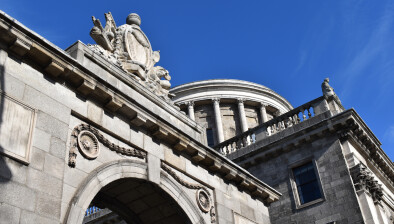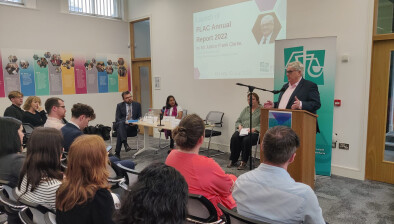Court of Appeal: Lay litigant awarded costs despite not being ‘entirely successful’ on appeal

Andrew McKeown BL
The Court of Appeal has ruled that a lay litigant is entitled to his appeal costs, despite the fact that his appeal was not “entirely successful”.

About this case:
- Citation:[2020] IECA 315
- Judgment:
- Court:Court of Appeal
- Judge:Ms Justice Mary Faherty
The man was successful in his appeal, the principal judgment of which was delivered earlier this year, and the Court of Appeal recently heard submissions on the matter of costs.
Background
Sean Corrigan sought High Court costs in defending Kevin P. Kilrane and Company Solicitors’ notice of motion to have his defamation proceedings struck out. He also sought his appeal costs.
He submitted that the task of the Court in the appeal was to find whether the words published by Kevin P Kilrane & Co were capable of bearing any of the meanings ascribed to them in his proceedings. He submitted that his appeal was successful in this regard.
In a judgment delivered in April 2020, the Court of Appeal had held that the trial judge had no further function save to determine whether the impugned words were reasonably capable of bearing a meaning ascribed by Mr Corrigan.
Kevin P Kilrane & Co’s application was to have the costs of both the High Court motion and the appeal reserved to the trial of the action. It was argued that as Mr Corrigan was a lay litigant, he was not entitled to an order for his costs and that any claim he has should be restricted to his vouched expenses.
An issue in the appeal was whether the trial judge erred in finding that the statements in the email of 25 November 2015 were not reasonably capable of being found to have a defamatory meaning. The judges did not agree that the words in the impugned email were reasonably capable of bearing all the meanings ascribed to them by Mr Corrigan but found that the words were capable of bearing one of the meanings ascribed to them. Kevin P Kilrane & Co submitted that the judge’s determination that the email was capable of bearing only one of the defamatory meanings ascribed to it radically altered and stripped back Mr Corrigan’s claim as to be virtually unrecognisable. Thus, while Mr Corrigan’s claim had been “revived”, it was radically altered in its scope.
Costs
It was submitted that the appropriate forum for a decision on the question of the costs of the entire proceedings, including the motion and the appeal, is the trial when it will be determined whether the impugned statement did in fact bear its solitary defamatory meaning. Counsel for Kevin P Kilrane & Co argued that the Court should depart from the practice of deciding the issue of costs at the stage at which the costs are incurred in favour of deferring it to the trial of the action.
The costs regime is set out in the Legal Services Regulation Act 2015 ss.168 and 169, and Ord.99 RSC. Section 169(1) provides that where the party seeking costs has been “entirely successful” in the proceedings, such party “is entitled to an award of costs unless the court orders otherwise”. In determining whether to order otherwise, the court should have regard to the “nature and circumstances of the case” and “the conduct of the proceedings by the parties”.
In Chubb European Group SE v The Health Insurance Authority [2020] IECA 183, Mr Justice Brian Murray set out the principles to be applied by the court in determining costs issues post-December 2019. In Veolia Water UK Plc v Fingal County Council (No. 2) [2007] 2 IR 81, Mr Justice Frank Clarke stated: “Parties who are required to bring a case to court in order to secure their rights are, prima facie, entitled to the reasonable costs of maintaining the proceedings.” Mr Justice Clarke also provided guidance on the proper application of the Veolia Water principles in MD v ND [2016] 2 IR 438.
Ms Justice Mary Faherty said that Kevin P Kilrane & Co’s arguments constituted “an attempt to re-argue issues aired at the appeal hearing and which have been determined by the Court. They do not in any meaningful way engage with the consequences of the Court’s findings in the principal judgment, the outcome of which is that Mr Corrigan has revived proceedings that had been struck out in their entirety by the High Court.”
While the judge said that it was “most definitely not the case that Mr Corrigan has been ‘entirely successful’ in the appeal”, as he had not persuaded the judges that the words in the impugned email were reasonably capable of bearing all the meanings ascribed to them, the court was still not swayed by Kevin P Kilrane & Co’s arguments. None of those arguments reasonably lead to a conclusion that the costs in the appeal should be deferred until the action has been determined because Mr Corrigan was not “entirely successful”. The judges had not been persuaded that Mr Corrigan had raised unmeritorious points in the appeal, or that any of the points on which he was unsuccessful materially increased the costs of the appeal hearing.
Conclusion
Ms Justice Faherty vacated the High Court costs order, with no order as to those costs, and found that Mr Corrigan was entitled to his costs in the appeal. Those costs, however, are limited to his reasonable outlay given that he was a lay litigant.












